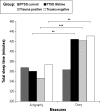Subjectively and objectively measured sleep with and without posttraumatic stress disorder and trauma exposure
- PMID: 22754042
- PMCID: PMC3369231
- DOI: 10.5665/sleep.1960
Subjectively and objectively measured sleep with and without posttraumatic stress disorder and trauma exposure
Abstract
Study objectives: Although reports of sleep disturbances are common among individuals with posttraumatic stress disorder (PTSD), results of polysomnographic (PSG) studies have inconsistently documented abnormalities and have therefore suggested "sleep state misperception." The authors' study objectives were to compare sleep parameters measured objectively and subjectively in the laboratory and at home in civilians with and without trauma exposure and PTSD.
Design: Cross-sectional study.
Setting: PSG recordings in a sleep laboratory and actigraphic recordings in participants' homes.
Participants: One hundred three urban-residing African Americans with and without trauma exposure and PTSD who participated in a larger study.
Interventions: N/A.
Measurements: Sleep parameters (total sleep time [TST], sleep onset latency [SOL], and wake after sleep onset [WASO]) were assessed using laboratory PSG and home actigraphy. A sleep diary was completed in the morning after PSG and actigraphy recordings. Habitual TST, SOL, and WASO were assessed using a sleep questionnaire. The Clinician Administered PTSD Scale was administered to assess participants' trauma exposure and PTSD diagnostic status.
Results: Participants, regardless of their trauma exposure/PTSD status, underestimated WASO in the diary and questionnaire relative to actigraphy and overestimated SOL in the diary relative to PSG. Among participants with current PTSD, TST diary estimates did not differ from the actigraphy measure in contrast with those without current PTSD who overestimated TST. No other significant group differences in discrepancies between subjective and objective sleep measures were found.
Conclusions: Discrepancies between subjectively and objectively measured sleep parameters were not associated with trauma exposure or PTSD. This challenges prior assertions that individuals with PTSD overreport their sleep disturbances.
Keywords: African Americans; Posttraumatic stress disorder (PTSD); actigraphy; polysomnography; sleep diary; sleep questionnaire; trauma.
Figures
Comment in
-
Sleep perception among individuals with posttraumatic stress disorder.Sleep. 2012 Jul 1;35(7):897-8. doi: 10.5665/sleep.1940. Sleep. 2012. PMID: 22754032 Free PMC article. No abstract available.
Similar articles
-
Comparison of Sleep Patterns in Vietnam Veterans With and Without Posttraumatic Stress Disorder Using Wrist Actigraphy.J Clin Sleep Med. 2019 May 15;15(5):725-732. doi: 10.5664/jcsm.7762. J Clin Sleep Med. 2019. PMID: 31053212 Free PMC article.
-
Sleep impairments in refugees diagnosed with post-traumatic stress disorder: a polysomnographic and self-report study.Eur J Psychotraumatol. 2023;14(1):2185943. doi: 10.1080/20008066.2023.2185943. Eur J Psychotraumatol. 2023. PMID: 36971225 Free PMC article. Clinical Trial.
-
Exploring Predictors of Sleep State Misperception in Women with Posttraumatic Stress Disorder.Behav Sleep Med. 2023 Jan-Feb;21(1):22-32. doi: 10.1080/15402002.2021.2024193. Epub 2022 Jan 10. Behav Sleep Med. 2023. PMID: 35007171 Free PMC article.
-
Actigraphic sleep monitoring in patients with post-traumatic stress disorder (PTSD): A meta-analysis.J Affect Disord. 2023 Jan 1;320:450-460. doi: 10.1016/j.jad.2022.09.045. Epub 2022 Sep 26. J Affect Disord. 2023. PMID: 36174789 Review.
-
Actigraphy in post traumatic stress disorder.Pak J Med Sci. 2014 Mar;30(2):438-42. Pak J Med Sci. 2014. PMID: 24772158 Free PMC article. Review.
Cited by
-
Metabotropic glutamate receptor function and regulation of sleep-wake cycles.Int Rev Neurobiol. 2023;168:93-175. doi: 10.1016/bs.irn.2022.11.002. Epub 2023 Jan 13. Int Rev Neurobiol. 2023. PMID: 36868636 Free PMC article.
-
Sleep Disturbance in Posttraumatic Stress Disorder: Epiphenomenon or Causal Factor?Curr Psychiatry Rep. 2017 Apr;19(4):22. doi: 10.1007/s11920-017-0773-y. Curr Psychiatry Rep. 2017. PMID: 28321643 Review.
-
One's sex, sleep, and posttraumatic stress disorder.Biol Sex Differ. 2012 Dec 31;3(1):29. doi: 10.1186/2042-6410-3-29. Biol Sex Differ. 2012. PMID: 23272647 Free PMC article.
-
Has adult sleep duration declined over the last 50+ years?Sleep Med Rev. 2016 Aug;28:69-85. doi: 10.1016/j.smrv.2015.08.004. Epub 2015 Aug 28. Sleep Med Rev. 2016. PMID: 26478985 Free PMC article. Review.
-
Better Sleep in a Strange Bed? Sleep Quality in South African Women with Posttraumatic Stress Disorder.Front Psychol. 2017 Sep 12;8:1555. doi: 10.3389/fpsyg.2017.01555. eCollection 2017. Front Psychol. 2017. PMID: 28955274 Free PMC article.
References
-
- American Psychiatric Association. Diagnostic and statistical manual of mental disorders. fourth edition - text revision. Washington, DC: American Psychiatric Association; 2000.
-
- Kobayashi I, Boarts JM, Delahanty DL. Polysomnographically measured sleep abnormalities in PTSD: a meta-analytic review. Psychophysiology. 2007;44:660–9. - PubMed
-
- Lavie P. Sleep disturbances in the wake of traumatic events. N Engl J Med. 2001;345:1825–32. - PubMed
-
- Carskadon M, Dement W, Mitler M, Guilleminault C, Zarcone V, Spiegel R. Self-reports versus sleep laboratory findings in 122 drug-free subjects with complaints of chronic insomnia. Am J Psychiatry. 1976;133:1382–8. - PubMed
-
- Frankel BL, Coursey RD, Buchbinder R, Snyder F. Recorded and reported sleep in chronic primary insomnia. Arch Gen Psychiatry. 1976;33:615–23. - PubMed
Publication types
MeSH terms
Grants and funding
LinkOut - more resources
Full Text Sources
Medical


